Search the Special Collections and Archives Portal
Search Results

Transcript of interview with Irwin Molasky by David G. Schwartz, April 23, 2014
Date
Archival Collection
Description
Interview with Irwin Molasky by David G. Schwartz, April 23, 2014. In this interview, Irwin Molasky discusses arriving in Las Vegas in the 1950s, and building the Pyramids motel on the Strip. He talks about the entertainers in various hotels on the Strip, the concept of the "star policy," and bringing Parisian shows to Las Vegas. He goes on to discuss his real estate developments, including Paradise Palms, Boulevard Mall, and Sunrise Hospital, and donating the land for the development of UNLV.
Irwin Molasky came to Las Vegas in 1951, during a time when "everyone knew everyone else," and there was a small, but strong Jewish community. An Army veteran, Irwin and his wife moved to Las Vegas after living in California for a short time. Irwin soon built The Pyramids, a Strip motel next to the Flamingo Hotel and Casino. The Pyramids opened the same day as its northern next-door neighbor, The Sands Hotel and Casino, on December 15, 1952. Irwin used his newly acquired contractor's license to become on the city's most important real estate developers. Over the next 60 years, he built everything from residential housing, including Paradise Palms to commercial properties. Projects included Sunrise Hospital and the surrounding medical buildings; Sunrise City Shopping Center and other power centers; Bank of America Plaza and much other downtown development; and golf courses. When the recession hit, Irwin began bidding on government projects across the country, successfully shielding his business and employees from the economic downturn. Irwin's real estate ventures not only had a tremendous impact on Las Vegas' economic development, but a substantial effect in social programming. Irwin donated 40 acres of prime real estate to the University of Nevada - Las Vegas (UNLV) so that university could expand. Additionally, he was the Founding Chairman of the UNLV Foundation and received an honorary doctorate in humanities.
Text
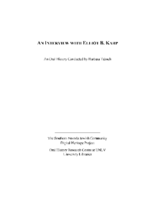
Transcript of interview with Elliot B. Karp by Barbara Tabach, December 17, 2014
Date
Archival Collection
Description
Interview with Elliot B. Karp by Barbara Tabach on December 17, 2014. In this interview, Elliot Karp discusses growing up in a culturally Jewish household in New York and becoming more observant in his teenage and college years. He decided, after a trip to Israel and a year in a rabbinical program, that he wanted to be a "Jewish professional" with a focus on social work and community organizing, and attended a Master's program at Brandeis University. Karp goes on to talk about his work for the Jewish Federation in Ohio and Pennsylvania, and being recruited to come to Las Vegas. He talks about the challenges in the Las Vegas Jewish community and the Jewish Federation's role as an umbrella organization to partner with other agencies to grow and sustain a robust Jewish community in Southern Nevada.
On October 6, 1955, Elliot Karp was born in Mineola, New York to parents of East European heritage who identified as culturally Jewish. As a teenager, Elliot felt the calling to become kosher, balancing this practice with household norms that were not as strict. He eventually became shomer Shabbat just after enrolling at State University of New York at Stony Brook, where he majored in Political Science. After graduating from SUNY, Elliot spent a year living in Israel considering a path in rabbinical studies. By the end of his time, he decided on a different, yet related path, and registered as a graduate student in Brandeis University's School of Jewish Communal Service, on fellowship from Council of Jewish Federations. After graduating, Elliot moved to Columbus, Ohio to work for the Jewish Federation, focusing on fundraising, but was exposed to many different operational areas of the organization. After three years, Elliot was recruited to the Philadelphia office as its director of leadership development. He then left the Federation to work in development at Brandeis University, but after two years, returned to the Federation as the Cincinnati office's chief development officer. In 2008, Elliot received a call to take his highly cultivated leadership and fundraising skills to another Federation office: Las Vegas. After much consideration, he took the job - and challenge - as the office's new chief executive officer. Since then, Elliot has done much to promote communication, coordination and collaboration within the local Jewish community and beyond, through relationship building and successful fundraising efforts. His ultimate desire is to expand funding for programs that get more people involved in Jewish life - while also empowering community members define what a Jewish life means for them.
Text

Transcript of interview with Miriam "Mimi" Katz by Barbara Tabach, December 10, 2014
Date
Archival Collection
Description
In this interview, Mimi Katz discusses growing up in the Boston area and her schooling, and moving to Washington, D.C. working as a physiotherapist. She returned to Boston and met her husband, and she talks about moving to Las Vegas and adjusting to life here. They became involved at Temple Beth Sholom, and Mimi worked as a conventions coordinator at the Sands and the Sahara. She discusses moving around in Las Vegas from an apartment to a house in the John S. Park neighborhood, working for the Jewish Federation, and helping to develop the Holocaust education program with Edythe Katz, conducting oral history interviews with survivors. She continued working at the Convention Center in the 1980s, and is involved in the Lou Ruvo Center.
Everyone knows her as Mimi. She was born Miriam Green to immigrant parents in Boston, Massachusetts, in 1926. As a youngster she danced, excelled at school and enjoyed an abundance of sports. To pay for her higher education at Massachusetts School of Physiotherapy she worked at Raytheon Manufacturing. In 1957 she married George Katz who swept her away to their honeymoon in Las Vegas. It's a story that she loves to recall-they never left. She sent for her things and energetically settled in to her new hometown and marriage. Mimi found employment with the Clark County School District, began having children (three daughters), and making fast new friends. Many of these friends were from the founding days of Temple Beth Sholom, which roots her to the history of the local Jewish community. In addition, for a decade she worked in community relations for the Jewish Federation. She valued community activism and volunteered over the years for many organizations; such as Easter Seals, Jewish War Veterans, Parent Teachers Association and the Lou Ruvo Center for Brain Health, and many more organizations over the subsequent decades.
Text
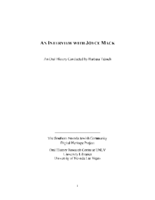
Transcript of interview with Joyce Mack by Barbara Tabach, February 23, 2015
Date
Archival Collection
Description
In this interview, Joyce Mack discusses meeting her husband, Jerry Mack, in Los Angeles,their early life as a couple, and moving to Las Vegas at the suggestion of Jerry's father, Nate Mack. She discusses how Jerry met Parry Thomas and their banking and real estate investments. Mrs. Mack talks about the opening of the Thomas and Mack Center at UNLV, and the development of the strip hotels, and discusses her children.
Joyce Mack: wife to Jerry Mack and matriarch of one of the most influential families of Las Vegas history. During this oral history conversation, she begins by tracing her family ancestry from Kiev to New York to Omaha and then Los Angeles, where she was born and raised. At a UCLA fraternity party in the early 1940s, a teenage Joyce Rosenberg was swept off her feet by her older brother's friend Jerry Mack. Jerry was from Boulder City, Nevada and had attended school in Las Vegas. In 1946, the couple married and took an extended honeymoon throughout the United States and Cuba. Soon afterwards, Jerry's father Nate Mack, a businessman and real estate developer encouraged the newlyweds to come to Las Vegas. She tells of Jerry sharing his vision of the valley's future. Thus began a successful journey that traverses decades of Las Vegas history and breathtaking growth in which the Macks were active participants and leaders. Joyce recalls the people the first met, who they raised their children side-by-side with and became lasting friends. These people were other Las Vegas pioneers including the Greenspuns and mostly importantly her husband's partnership with Parry Thomas which created the Bank of Las Vegas. It was their partnership she explains that reduced the presence of the mob element. As members of the small Jewish community of the late 1940s, the Macks would participate in the founding of Temple Beth Sholom.
Text

Transcript of interview with Milton I. Schwartz by Claytee White, May 4, 2004
Date
Archival Collection
Description
In this interview, Milton Schwartz discusses his life in Las Vegas and his business investments. He worked at the Flamingo Hotel right after World War II, and he started Valley Hospital as an investor in 1970. Schwartz has a Hebrew academy named after him in Israel, and owned the Yellow-Checker-Star Cab Company. He was active in the Republican Party.
Milton I. Schwartz was born and raised in Brooklyn, New York. He enlisted in the Army the day after Pearl Harbor (age 20) and did a five year stint in the Pacific as a repeater specialist. After the war he returned to his job as a refrigeration mechanic in Brooklyn and was soon offered a job out in Las Vegas at the Flamingo Hotel, which was owned by Bugsy Siegel. After three months in Las Vegas, during which time he had several conversations over dinner with Beldon Cattleman, Milton returned to New York to work with his father in the fixture business. After ten years he sold that business and bought into Design Equipment Construction, which brought him back to Las Vegas. Milton started or bought many businesses over the years, but the one he's proudest of is Valley Hospital. He and his partners brought the first medical helicopters into Nevada and he feels that many lives were saved because of that. He also invested in Yellow-Checker-Star Cab Company, which he still owns. Two on-going concerns that are important to Milton are his involvement with the Republican Party and the Milton I. Schwartz Hebrew Academy in Israel. Of the many awards and plaques he has earned over the decades, he is proudest of the birthday acknowledgements from the Academy. He believes strongly that the most important achievements of his life revolve around his religion and the children being educated in it. Milton shares many stories, facts, descriptions, and anecdotes about Las Vegas in the decades since 1946. He built a house in the Scotch 80's, contributes to UNLV, and approves of city growth and the proposed changes in the downtown area. He has contributed much to the growth and stability of the Las Vegas valley.
Text
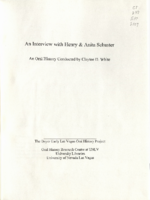
Transcript of interview with Henry and Anita Schuster by Claytee White, March-April 2011
Date
Archival Collection
Description
In this oral history, the long married couple Henry and Anita Schuster recall the history of the 1930s and how they eventually met and created a life together. Their childhoods were distinctively different, but charter a future where they would inevitably meet. Born in Germany in 1926, Henry recalls the dawn of Hitler and the Nazism. His mother would arrange for his evacuation to France, where he would not know her fate or that of his two sisters for a number of years. Along with hundreds of other displaced children, he escaped to America and lived with relatives in Louisiana where he finished his schooling and joined the US Army. Anita on the other hand grew up with her family in New York. They share the story of meeting when she was 16, falling in love and marrying in 1948. They had four children and moved several times before settling in California. They retired to Las Vegas in 1993. Henry's recollections include childhood memories of the Holocaust and its affect on his family, including the loss of his mother and one of his sisters. Finding his surviving sister Bertel (Betty Kale) after the war is a heartwarming tale of survival. The Schusters are part of the approximately 300 members of the Holocaust Survivor Group that has settled in southern Nevada and Henry was President Emeritus of the group. He published his memoir, Abraham's Son-the Making of an American, in 2010.
Text
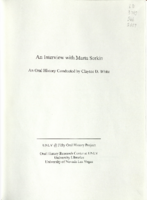
Transcript of interview with Marta Sorkin by Claytee White, March 2, 2009
Date
Archival Collection
Description
In this interview, conducted for the 50th anniversary of UNLV, Marta Sorkin discusses her family and her experience moving to California, and then to Las Vegas. Sorkin worked at the James R. Dickinson Library at UNLV and later in Lied Library, helping to implement and update various databases, and create displays on current topics. She briefly discusses her involvement with Hillel and the Jewish Federation of Las Vegas.
Marta Sorkin begins by reminiscing about her childhood in Far Rockaway Long Island, New York. She details the life her parents lived, which set an example for Marta and her two siblings. Through hard work, advanced education, and involvement in causes that were important to them, they created the template by which Marta lives her life. Marta describes her early work history, which included modeling, sales, library work, and working part time in her father's dry-cleaning plant. She and her daughter were living with her parents for a time in California, and they visited Las Vegas on weekends. It was during one of those visits that Marta met her second husband-to-be. They eventually married and decided to settle in Las Vegas. In Las Vegas, Marta enrolled at UNLV, became involved with the Preservation Association of Clark County, and volunteered at the Jewish Federation of Las Vegas. In addition, she completed her BA and MA degrees at UNLV and started working at the university's library. She details her work there, including creating display cases, working in the reference section, doing research for students and faculty, and compiling interviews. Marta also describes the fundraisers she spearheaded to help raise money for the various societies she was involved with: non-events, pancake breakfasts, dinners, and dance and band performances. In her closing comments she mentions an interview she did for Ralph Roske's class and expresses her appreciation for the career she's had at UNLV.
Text

Transcript of interview with Walter Weiss by Claytee White, November 2, 2010
Date
Archival Collection
Description
In this interview, Walter Weiss discusses how Judaism and boxing kept him out of trouble in his youth. Weiss grew up in the Boston area, and started boxing as a teenager. Weiss talks about his boxing training, becoming a runner for a bookmaker, and coming to Las Vegas in the 1950s to be a bookmaker for the Stardust Hotel, and working the slot machine floor. He had several different jobs in various casinos, and discusses different people involved in the gaming industry in Las Vegas.
Walter Weiss life story begins in a Malden, Massachusetts during the Great Depression. His early background was a blend of observant Judaism, secularism, and the effects of the era. He was a troubled youth whose older brother encouraged him to join him in boxing. As Walter explains: I was a wild kid and ... boxing saved my life. His aptitude for boxing led him to be a sparring partner in New York City's famous Spillman Gym. There he met and worked out with some of the greatest fighters of the era, including Rocky Marciano. He recalls how he turned professional while attending the University of Miami and how he first came to Las Vegas in 1958 to escape his personal troubles and find work with a local bookmaker. Thus began his diverse employment history in the casino industry. He details his various positions and the cast of famous and infamous characters of the times. For six years he return to New York and worked as a Wall Street broker before arriving back in Las Vegas in 1973. He talks about his property ownership, lobbying for an amendment to Senate Bill 208, his personal religious changes and a sundry of observations about the changes that occurred as the state took over gaming.
Text

Transcript of interview with Michael S. Mack by Claytee White, May 21, 2009
Date
Archival Collection
Description
During this interview, Michael Mack visualizes his childhood memories of the later 1930s, when Las Vegas was a small, but steadily growing, desert town. As he says, "The desert was our backyard." The Strip hotels like the last Frontier and the Flamingo pop into the stories, but it was basically an innocent time. He attended John S. Park Elementary when classrooms were temporary buildings from the local Air Force base and the neighborhood was filled with children. He still maintains close friendships from that time. And he also recalls friends from the Westside neighborhood. Michael talks of scouting, riding horses, and watching Helldorado parades.
Michael Mack's first recollection of Las Vegas is as a two-year-old living in a duplex on Bonneville Ave. Though the family moved several times, they remained in or near the John S. Park neighborhood. Michael's father was a Polish immigrant who arrived in Boulder City, where he opened a shoe store, in 1932. The building of the Hoover Dam brought opportunities and his father Louis expanded into the salvage business. In time Louis moved the family to Las Vegas, opened a retail clothing store, which eventually sold uniforms, and set up the first local bail bondman office. During this interview, Michael visualizes his childhood memories of the later 1930s, when Las Vegas was a small, but steadily growing, desert town. As he says, "The desert was our backyard." The Strip hotels like the last Frontier and the Flamingo pop into the stories, but it was basically an innocent time. He attended John S. Park Elementary when classrooms were temporary buildings from the local Air Force base and the neighborhood was filled with children. He still maintains close friendships from that time. And he also recalls friends from the Westside neighborhood. Michael talks of scouting, riding horses, and watching Helldorado parades. Though the Macks were a Jewish family, Michael's mother always brought the Christmas tree to school. It was a period when people memorized each other's 3-digit phone numbers, went to movies for 14 cents, and there was a ranch for people to stay while getting divorced. Halloween Trick-or-treaters in the John S. Park neighborhood might get a tasty cupcake or a shiny dime. Michael has a plethora of stories about innocent mischief and the unique experiences of a boy growing up in Las Vegas.
Text
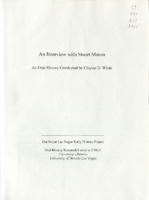
Transcript of interview with Stuart Mason by Claytee White, November 9, 2006
Date
Archival Collection
Description
In this interview, Stuart Mason discusses his family's construction business, Taylor Construction Co., and his involvement with building various Las Vegas Strip hotels including Caesars Palace and the Riviera, and remodeling the Flamingo. He talks about working within a "social contract" with the various unions, and other aspects of construction.
Stuart Mason was born in Columbus, Ohio, and moved with his family to Miami, Florida, when he was two years old. He received his bachelor's degree in business administration from the University of Miami in 1958. Shortly after graduation, he married his wife, Flora, and started working for Taylor International, the family business. He came to Las Vegas in 1964 to start work on Caesars Palace as the assistant project manager and eventually took over the management of the business. Mason has contributed greatly to the city of Las Vegas over the years through his contributions in the development and construction of the Las Vegas Strip and his commitment to the community. He and Flora started the Nevada Chapter of the Juvenile Diabetes Research Foundation in 1970. In addition, they made donations to the UNLV University Libraries to benefit the Undergraduate Peer Research Coaches program, which helps undergraduate students obtain their college degrees. In addition to his work on Caesars Palace, Mason worked on the original and new MGMs, The Rivera, The International, the Stratosphere, and the Desert Inn, along with remodeling work at the Flamingo. Other company projects can be found in Miami, Jamaica, Aruba, the Grand Bahamas, Melbourne and Puerto Rico. His two sons took over the family business in 1997, the same year that Mason started as the Vice President of Development for the Venetian Hotel Casino.
Text
